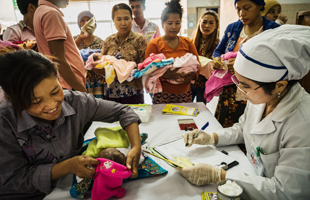
New study findings published today confirm that antiviral therapy with tenofovir in late pregnancy can result in a 3-fold reduction in mother-to-child transmission (MTCT) of hepatitis B virus (HBV), when used in combination with immunoglobulin and HBV vaccine at birth.
"The new findings show that antiviral therapy will have an important future role in elimination of MTCT of hepatitis B, especially in women with high levels of virus," said Dr Gottfried Hirnschall, Director of the World Health Organization’s (WHO) HIV/AIDS Department and Global Hepatitis Programme. "WHO will update its HBV guidelines in view of the growing evidence, as well as help address challenges in putting this into practice in different parts of the world.”
Viral hepatitis is an international public health challenge, comparable to communicable diseases such as HIV, tuberculosis and malaria. Worldwide, approximately 240 million people have chronic HBV. MTCT is the most common form of transmission of HBV in many high-prevalence areas such as East Asia and may occur in up to 90% of mothers, if specific interventions are not provided.
WHO currently recommends that all newborns be given timely HBV vaccine at birth, followed by 2 or 3 additional doses. Birth dose vaccination prevents HBV transmission to the infant in most cases, but some women with high levels of HBV may still transmit infection to their children.
The WHO Western Pacific Region, which includes China where the study took place, has particularly high rates of HBV infection. With only a quarter of the world's population, the region bears 40% of global deaths from viral hepatitis, with more than 1500 lives lost each day due to hepatitis.
"We’ve had great success in improving HBV vaccination over the past 25 years," said Dr Shin Young-soo, WHO’s Regional Director for the Western Pacific. "We need to move to the next phase in addressing hepatitis and to provide access to timely diagnosis and treatment for the hundreds of millions living with the often-devastating consequences of chronic viral hepatitis."
High immunization coverage in the Western Pacific Region has successfully averted 7 million deaths that would have occurred in the lifetime of children born between 1990 and 2014. However, some children, in particular those born to mothers with high viral load, get infected even if they get the recommended vaccine.
Findings of the new study in China
This recent randomized controlled trial enrolled 200 women with high viral load of HBV living at 5 sites in 5 geographic regions in China, between March 2012 and June 2013. They were in late pregnancy and were provided tenofovir therapy starting from 30 to 32 weeks of gestation until 4 weeks after the birth. All delivered infants in the study were given immunoglobulin and birth dose HBV vaccine, followed by two additional HBV vaccinations.
The study resulted in a 3-fold reduction in transmission for highly infectious pregnant mothers from 18% to 5%.
China is home to about 90 million people living with Hepatitis B, the largest number in any country worldwide. Approximately 6% of women giving birth are living with HBV. “China has achieved extraordinary success in increasing hepatitis B vaccine coverage among newborns over the last two decades," said Dr Bernhard Schwartländer, WHO Representative in China. "The findings of this study show that adding cutting edge treatment for Hepatitis B of pregnant women to the package of interventions available today, will not only have health benefits for mothers, it will help China another step closer to the goal of a hepatitis-free generation".
The HBV infection rates in China dropped from 9.75% in the general population, including children aged 1–4 years, in 1992 to as little as 0.32% in children under the age of 5 in 2014. But with an estimated 15 million births occurring annually, 50
000 children are born with HBV every year, despite vaccination efforts.
